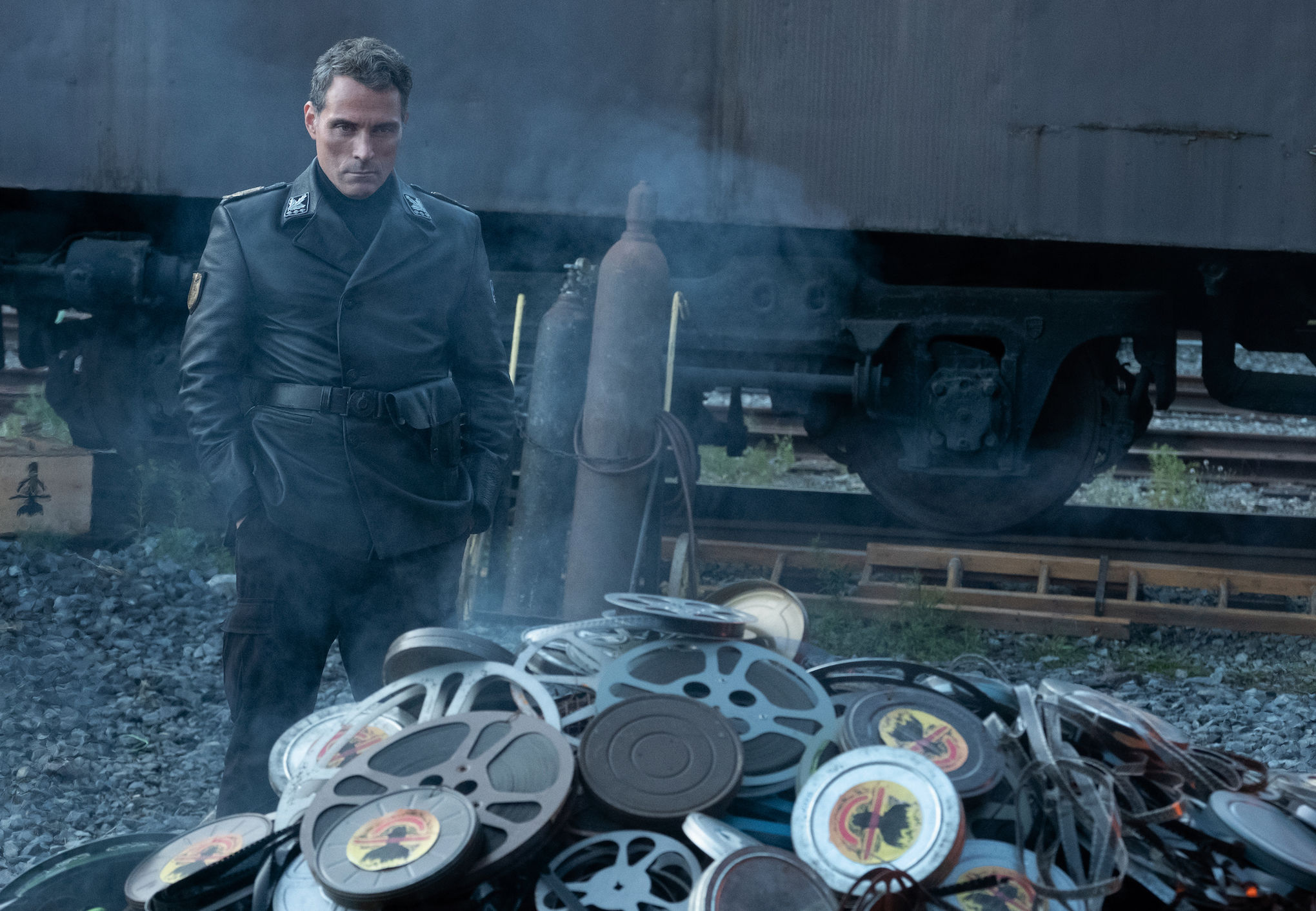Create a free profile to get unlimited access to exclusive videos, sweepstakes, and more!
Why a happy ending couldn't work as a part of The Man in the High Castle's legacy

One of the biggest questions any show has to face when it plans for the end is what tone to aim for. After all, any child who grew up on fairy tales wants a happy ending — but for a show such as Amazon's The Man in the High Castle, a happy ending might feel like a weird choice.
After all, the show's premise is rooted in the definition of an unhappy ending: In this alternate universe, the Axis powers won World War II, and so in the 1960s, America is under the control of Nazi Germany and Imperial Japan. Thus, as cast member Chelah Horsdal told SYFY WIRE, "I don't think a happy ending for this show would necessarily serve the story."
Though, in fairness, the complicated ethics of this show's characters mean that, as Joel de la Fuente put it, "one thing that's happy for one person is not so happy for another."
After all, over the four seasons, the show has both chronicled both sides of the battle over America's dwindling freedoms, oppressors and rebels alike. This has meant that certain characters have elicited the sympathies of the audience, as Rufus Sewell, who plays an American-born Nazi official acknowledged. "I personally felt that there's an inevitability about the way that this must end, but there are certain fans of the show who want things to end pleasantly for people," he says, but "I don't think that has ever been what should happen, you know, so I feel very satisfied with this last season."
"You'd be surprised by what some people want," Sewell adds.
Horsdal chimes in: "So you'd be surprised how happy it actually ends up."
Of course, as Jason O'Mara, who plays a key figure in the anti-Nazi resistance movement, points out, "from what character's point of view, right? And any happy ending could be sadder if you go deeper into the story."
According to executive producer Isa Dick Hackett, who has overseen the show since the beginning, the conversation around writing the ending was not about gauging its relative happiness, but instead to give the show's fans "a satisfying conclusion, and so that they feel like they took this journey and there was a clear end."
This meant, she says, not ultimately redeeming any characters, or "putting a big red bow" on the final moments because "the novel itself and the intent of the work is to remind people that fascism is a threat that's everpresent, that's not changing. It's something we have to be mindful of."
That message is also what the cast felt was the most important part of the show's legacy, though as Frances Turner, who plays new Season 4 addition Bell Mallory, notes, how the show is actually remembered may not be clear until "a few years have gone by and the current political climate has changed. I suspect people may discover the show again, when it doesn't feel quite as relevant."
While The Man in the High Castle premiered in 2015, seasons two through four were produced as Donald Trump ascended to the White House — and making the show under the shadow of his administration has been something the cast has been very conscious of. As O'Mara puts it, "I'm hoping [the show] will stand as a sort of a four-year block that somehow is a record, some sort of testament, to what happened."
Joel de la Fuente agrees, adding that "It's impossible to deny that real life began to mirror our show. Our show was started before the elections in 2016, but you cannot deny that the last season of our show, which drops on Friday, is influenced by our reality. Now, it's a response to what's happening now."
Its relevance to today also haunts Hackett. "We never imagined our own world would grow increasingly more like the world of the show," she says. "Nobody ever imagined when we were first making it, Maybe the show was made at just the right time. I hope."
Adds O'Mara: "I hope, from a storytelling perspective, it encourages the audience to really know that we have the luxury of taking our freedoms for granted. And you should fight for the world that you want now so that you don't end up in a reality where you have to make the choices that these characters have had to make. As awful as it looks on screen — it doesn't have to be that way if you fight now."
Sewell says that when people talk to him about the show, even from the first season, they say "I don't believe that could happen in America." To them, he replies, "You just add the word 'overnight' to that phrase, and then I'll go along with you. As we've learned, these things happen incrementally, minutely, bit by bit. In order to survive their lives and in order to exist in a way that is comfortable, people incrementally get used to changes, and yesterday's horror is today's background noise. This is what happens to people. That's what the show is about. And we're seeing it."
"When an iceberg collapses, you know, it happens suddenly, but then you realize something's been happening for a long time underneath," de la Fuente adds.
It's a dark topic, but Hackett says she hoped the show's ultimate ending offered fans a glimpse of light.
"At the end of the day, I am actually hoping that people feel inspired. I think it's hopeful without being sugar-coated," she says. "And I hope that people think about resistance, and think about the ways in which everyday people can resist, and think about what we have and what is important to hold on to. I do hope that it sticks with people — that it serves as a warning and at the same time an inspiration."
The Man in the High Castle is streaming now on Amazon.

























